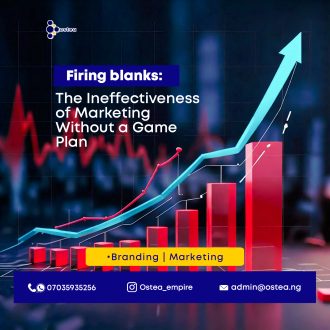
In the fast-paced world of business, the pressure to deliver immediate results can lead to impulsive decisions. One common mistake many businesses make is diving into marketing without a well-thought-out strategy. While this approach may seem to work in the short term, it often leads to wasted resources and missed opportunities. In essence, marketing without a strategy is like shooting without targeting—there’s a lot of action, but little to show for it.
A strategy serves as the blueprint for your marketing efforts. It provides a clear direction and ensures that every action taken is aligned with your business goals. Without a strategy, your marketing efforts are scattered, unfocused, and ultimately ineffective.
When you shoot without targeting, you may hit something, but it’s likely not what you were aiming for. Similarly, when you market without a strategy, you may see some results, but they’re often not aligned with your overall business objectives. You might gain followers, generate leads, or even make some sales, but if these efforts aren’t contributing to your long-term goals, they’re essentially wasted.
Engaging in random acts of marketing—such as sporadically posting on social media, running unplanned ad campaigns, or creating content without a clear purpose—can lead to several issues:
1. Wasted Resources: Time, money, and effort are expended on marketing activities that don’t yield the desired results. This is akin to spending money on bullets but never hitting the target.
2. Brand Inconsistency: Without a strategy, your messaging can become inconsistent, confusing your audience about what your brand stands for. Imagine shooting in different directions—each shot may hit something, but the impact is scattered and lacks cohesion.
3. Missed Opportunities: When you’re not clear on your target, you may miss opportunities that align perfectly with your goals. By the time you realize what you’ve missed, it may be too late to capitalize on it.
4. Inaccurate Measurement of Success: If your marketing efforts aren’t tied to specific goals, it’s difficult to measure success accurately. You may see an increase in website traffic or social media engagement, but without a strategy, these metrics don’t provide meaningful insights.
Creating a marketing strategy involves several key steps that ensure your efforts are focused and effective:
1. Define Clear Objectives: What do you want to achieve with your marketing? Whether it’s increasing brand awareness, generating leads, or driving sales, your objectives should be specific, measurable, achievable, relevant, and time-bound (SMART).
2. Understand Your Target Audience: Know who you’re aiming at. Understanding your audience’s needs, preferences, and behaviors allows you to tailor your marketing efforts to resonate with them effectively.
3. Choose the Right Channels: Not every marketing channel is suitable for every business. Based on your audience and objectives, select the channels that will give you the best return on investment.
4. Develop a Content Strategy: Content is king, but it must be relevant and valuable. Plan your content around your audience’s pain points and interests, and ensure it aligns with your brand message.
5. Set a Budget: Allocate your resources wisely. A well-planned budget ensures that you’re investing in the right areas without overspending.
6. Measure and Adjust: Continuously monitor your marketing efforts and measure them against your objectives. Be ready to adjust your strategy based on the results to stay on target.
Conclusion: Aim Before You Shoot
Marketing is an investment, and like any investment, it requires careful planning and execution. Without a strategy, your marketing efforts are like shooting without targeting—you may be active, but you’re unlikely to hit your desired mark. By taking the time to develop a clear, focused marketing strategy, you can ensure that every action you take is purposeful, aligned with your business goals, and more likely to deliver the results you’re aiming for.
In the end, marketing without a strategy is just noise. With a strategy, it becomes a powerful tool that drives growth and success. So, before you pull the trigger on your next marketing campaign, make sure you’ve taken the time to aim—your business will thank you for it.